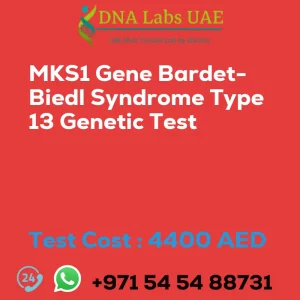AR Gene Androgen insensitivity Genetic Test
Welcome to DNA Labs UAE, where we offer the AR Gene Androgen insensitivity Genetic Test. This test analyzes the AR gene for mutations or variations associated with androgen insensitivity syndrome (AIS). AIS is a condition where individuals with XY chromosomes have reduced or absent response to male sex hormones (androgens).
Test Components
- AR Gene Androgen insensitivity Genetic Test
Price
4400.0 AED
Sample Condition
Blood or Extracted DNA or One drop Blood on FTA Card
Report Delivery
3 to 4 Weeks
Method
NGS Technology
Test Type
Hepatology Nephrology Endocrinology Disorders
Doctor
General Physician
Test Department
Genetics
Pre Test Information
Clinical History of Patient who is going for AR Gene Androgen insensitivity NGS Genetic DNA Test. A Genetic Counselling session to draw a pedigree chart of family members affected with AR Gene Androgen insensitivity NGS Genetic DNA Test gene AR
Test Details
The AR Gene Androgen insensitivity NGS Genetic Test is a type of genetic test that analyzes the AR gene for mutations or variations associated with androgen insensitivity syndrome (AIS). The AR gene provides instructions for making the androgen receptor protein, which is essential for the normal development and function of male sexual characteristics.
Mutations or variations in this gene can disrupt the androgen receptor’s ability to bind to androgens, leading to AIS. NGS (Next-Generation Sequencing) technology is used in this genetic test to analyze the entire coding region of the AR gene. It allows for the detection of small genetic changes or mutations that may be responsible for AIS.
The AR Gene Androgen insensitivity NGS Genetic Test can be used to diagnose AIS and provide information about the specific genetic variant present in an individual. This information can help in understanding the severity of the condition, predicting the risk of AIS in future generations, and guiding treatment decisions.
It is important to note that genetic testing should be performed and interpreted by healthcare professionals with expertise in genetics and genetic counseling. Genetic testing results should be discussed with a healthcare provider to understand the implications and potential management options.
| Test Name | AR Gene Androgen insensitivity Genetic Test |
|---|---|
| Components | |
| Price | 4400.0 AED |
| Sample Condition | Blood or Extracted DNA or One drop Blood on FTA Card |
| Report Delivery | 3 to 4 Weeks |
| Method | NGS Technology |
| Test type | Hepatology Nephrology Endocrinology Disorders |
| Doctor | General Physician |
| Test Department: | Genetics |
| Pre Test Information | Clinical History of Patient who is going for AR Gene Androgen insensitivity NGS Genetic DNA Test. A Genetic Counselling session to draw a pedigree chart of family members affected with AR Gene Androgen insensitivity NGS Genetic DNA Test gene AR |
| Test Details |
AR Gene Androgen insensitivity NGS Genetic Test is a type of genetic test that analyzes the AR gene for mutations or variations associated with androgen insensitivity syndrome (AIS). AIS is a condition where individuals with XY chromosomes have reduced or absent response to male sex hormones (androgens). The AR gene provides instructions for making the androgen receptor protein, which is essential for the normal development and function of male sexual characteristics. Mutations or variations in this gene can disrupt the androgen receptor’s ability to bind to androgens, leading to AIS. NGS (Next-Generation Sequencing) technology is used in this genetic test to analyze the entire coding region of the AR gene. It allows for the detection of small genetic changes or mutations that may be responsible for AIS. The AR Gene Androgen insensitivity NGS Genetic Test can be used to diagnose AIS and provide information about the specific genetic variant present in an individual. This information can help in understanding the severity of the condition, predicting the risk of AIS in future generations, and guiding treatment decisions. It is important to note that genetic testing should be performed and interpreted by healthcare professionals with expertise in genetics and genetic counseling. Genetic testing results should be discussed with a healthcare provider to understand the implications and potential management options. |








